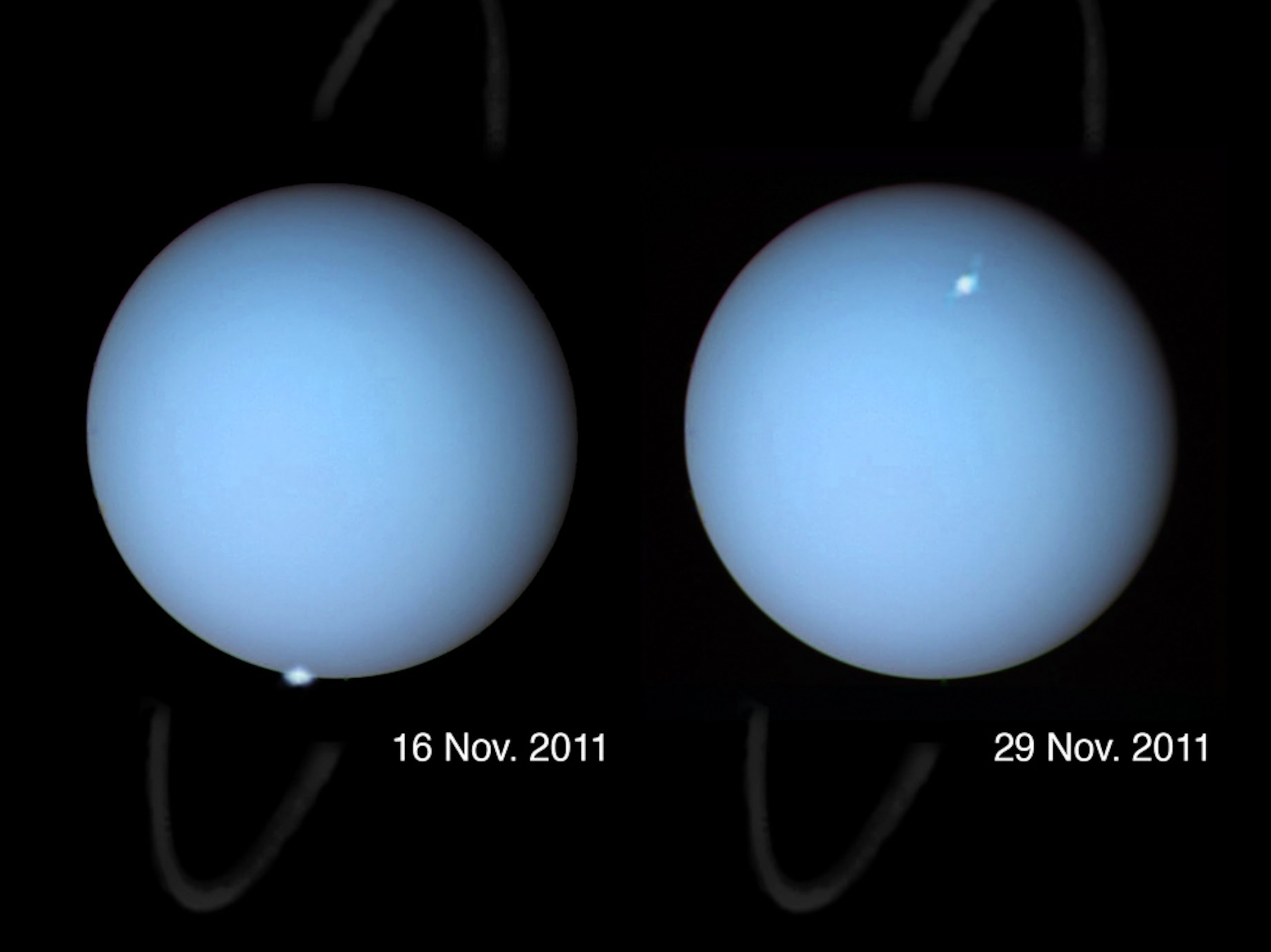
Auroras Seen on Uranus For First Time
Hubble spots fleeting light shows on icy planet.
For the first time, astronomers have snapped photos of auroras lighting up Uranus's icy atmosphere.
Two fleeting, Earth-size auroral storms were imaged by the Hubble Space Telescope as they flared up on the dayside of the gas giant in November 2011. (See "Uranus Has a Bright New Spot, Picture Shows.")
"The last time we had any definite signals of auroral activity on Uranus was when NASA's Voyager 2 probe swung by in 1986," said study leader Laurent Lamy, an astronomer at the Observatoire de Paris in Meudon, France.
"But this is the first time we can actually see these emissions light up with an Earth-based telescope."
Uranus Auroras Seen in Stroke of Luck
Auroras are light displays often seen at the highest latitudes of Earth, Jupiter, and Saturn—all of which all have magnetospheres that act as shields against incoming solar storms. (See "Photos: Multicolored Auroras Sparked by Double Sun Blast.")
Auroras tend to surround a planet's poles, where magnetic field lines converge and funnel incoming charged solar particles into the planet's atmosphere. There, the particles collide with air molecules, making the molecules glow.
Scientists tried unsuccessfully to detect auroras on Uranus in 1998 and 2005. In September 2011, Lamy and his team learned of an impending solar storm directed toward Uranus, which sits about 2.5 billion miles (4 billion kilometers) from Earth.
The team timed their Hubble observations specifically to coincide with the solar storm, and about six weeks later, Hubble spotted the auroras flaring up in Uranus's upper atmosphere. (Related: "Solar Flare: What If Biggest Known Sun Storm Hit Today?")
"We definitely had luck on our side to catch these faint flashes," Lamy said.
Oddball Planet May Influence Auroras
The auroras' unusual appearance might have something to do with the planet's oddball orientation.
Unlike the other seven planets, Uranus's magnetic axis is 60 degrees off from its spin axis. In addition, spin axis itself has a bizarre 98-degree tilt relative to the solar system's orbital plane. In other words, the planet seems to roll around on its side as it orbits the sun.
(See solar system pictures.)
Uranus's auroras are very short-lived, and Lamy speculates that's because of the difference between the orientation of the incoming solar particles and the planet's unusual magnetic field.
"These auroras will offer clues as to the exact location of the magnetic axis ... which then allow us to tell for the first time which parts of the magnetosphere is active," Lamy said.
"There is no doubt Uranus is a mysterious planet. We just don't know too much about [it]—especially its magnetosphere—but it's finally slowly revealing its secrets."
Uranus Observations "Urgent"
Now that his team has proven that Hubble can spot auroras on Uranus, Lamy hopes to get more of Hubble's observation time.
"We have had virtually no observations of these events for nearly a quarter century, but now we know we have a unique tool at our disposal," he said.
"Unfortunately Hubble is nearing the end of its life, so it's quite urgent we get as many opportunities as possible to observe these distant auroras before it closes its eye for good."
The study of Uranus's auroras is being published this week in Geophysical Research Letters, a journal of the American Geophysical Union.